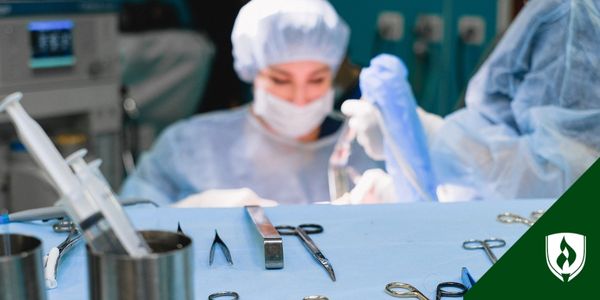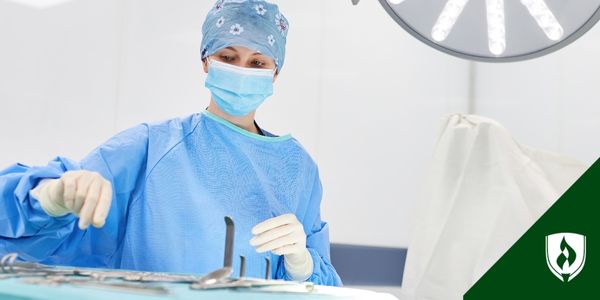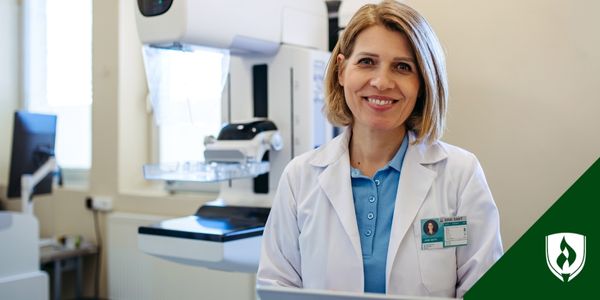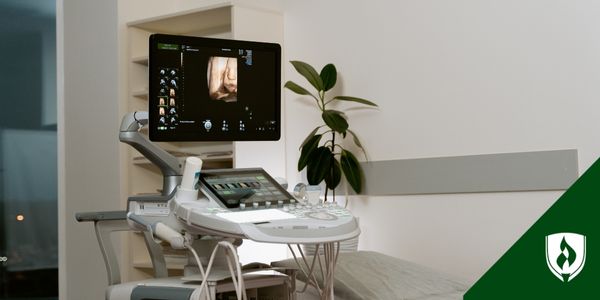What Does a Medical Laboratory Technician Do?
06/10/2025

You’ve heard about the exciting growth in the healthcare industry, but you don’t exactly picture yourself as a doctor or nurse. It’s important to know that not all healthcare careers involve direct patient care. There are in-demand opportunities in the field that allow you to work behind-the-scenes while still having a positive impact on people’s health
Becoming a medical laboratory technician (MLT) is one of those opportunities. The bright future of this field is indicated by the estimated 5% increase in employment for medical lab technicians through 2033, according to the Bureau of Labor Statistics (BLS).1
Before committing to pursue this profession, you need to be able to answer the following question: What does a medical lab technician do?
We’re here to help answer that and other questions you may have about this career so you’ll have a better understanding of if it’s the right one for you.
What Role Does a Medical Lab Technician Play in the Healthcare Field?
Doctors, nurses, and medical professionals rely heavily on the accurate data provided by lab testing. Medical laboratory technicians play a vital role in this process. They work under the supervision of laboratory managers, physicians, or clinical laboratory technologists in settings such as hospital laboratories, diagnostic labs, or outpatient clinics.
As a clinical laboratory technician, you’ll perform tests on biological specimens like blood, urine, and tissue samples to help identify diseases and monitor patient health. These professionals rarely interact directly with patients, but their work is crucial in diagnosing conditions and guiding treatment.
If you do meet a lab technician during your healthcare experience, they might be the person preparing or collecting your sample, outfitted in gloves, goggles, and a lab coat to ensure sample integrity and personal safety.
Key Responsibilities of a Medical Laboratory Technician
You know medical lab technicians perform tests, but what kinds of tests? What exactly are they analyzing?
At its core, the job involves analyzing body fluids, cell samples, and other substances using microscopes and specialized equipment. These laboratory tests are used to detect abnormalities that could indicate disease or infection. Technicians use both manual methods and automated equipment to ensure test results meet established standards and support accurate diagnoses.
According to the BLS, medical lab technicians may also:2
- Set up, maintain, clean, and calibrate lab equipment
- Prepare solutions or reagents for preparing specimens
- Collect tissue samples, blood, or other patient samples
- Assist with quality control procedures and documentation
In addition, some technicians analyze the chemical content of fluids, match blood compatibility for transfusions, or use microscopy to detect bacteria, parasites, or other microorganisms—all within a secure, well-regulated laboratory setting.
What Are Some Medical Lab Technician Specialties?
Your exact duties as a medical lab tech will depend on your specialization. Some MLTs work in clinical pathology, while others focus on more narrow areas such as:
- Phlebotomy (drawing and testing blood)
- Microbiology
- Immunology
- Blood banking
- Molecular biology
- Clinical chemistry
These specialties often involve handling medical technology, operating automated equipment, and following strict procedures to protect sample accuracy and patient data.
What Are Some Important Medical Lab Technician Skills?
Medical laboratory technicians must combine technical ability with soft skills to succeed in fast-paced, high-stakes work environments. In addition to the hands-on training, some important skills include:3
- Analytical skills: Ability to examine specimens and interpret test results
- Detail oriented: Must follow precise laboratory procedures and protocols
- Dexterity: Steady hands for handling needles and working with delicate lab equipment
- Interpersonal skills: Compassionate communication when collecting samples from patients
- Physical stamina: Ability to stand for long periods and help position patients
Candidates who identify with the skills listed above may be well-suited for a medical lab technician career.4 Don’t let the technical skills intimidate you, as these are the types of skills taught in a medical laboratory technician program.5
How Do You Become a Medical Lab Technician?
Now that you have a clearer picture of what medical laboratory technicians do, let’s look at how to become one.
Most employers require an associate degree in clinical laboratory science or medical laboratory technology.3 Some programs can be completed in as little as 21 months.6 These programs are typically accredited by the National Accrediting Agency for Clinical Laboratory Sciences® (NAACLS®) and prepare students for certification and entry-level work.
Common Medical Lab Technician Courses
- Medical terminology
- Clinical Chemistry
- Clinical Microbiology
- Phlebotomy
- Hematology
- Urinalysis
- Immunology
- Immunohematology
In addition to a formal education, some states may also require laboratory personnel to be licensed. To learn the requirements in your state, visit the American Society for Clinical Laboratory Science (ASCLS) website.7 You may find that your state also requires MLTs to become certified in order to obtain licensure. No matter whether or not your state requires it for licensure, becoming a certified medical lab tech8 is still a smart option for lab techs, as it shows a dedication to the field and confirmation of what you’ve learned in an academic program.
Can You See Yourself as a Medical Lab Technician?
The next time someone asks, “What does a medical lab tech do?” you’ll now be able to answer confidently. MLTs play a critical but often overlooked role in the daily operations of a healthcare facility.
If you’re considering becoming a medical lab technician, learn more about the path ahead in our article, “How to Become a Medical Lab Technician.”
1 Bureau of Labor Statistics, U.S. Department of Labor, Occupational Outlook Handbook, “Clinical Laboratory Technologists and Technicians – Pay,” https://www.bls.gov/ooh/healthcare/clinical-laboratory-technologists-and-technicians.htm#tab-6 (visited Apr. 29, 2025).
2 Bureau of Labor Statistics, U.S. Department of Labor, Occupational Outlook Handbook, “Clinical Laboratory Technologists and Technicians – What They Do,” https://www.bls.gov/ooh/healthcare/clinical-laboratory-technologists-and-technicians.htm#tab-2 (visited Apr. 29, 2025).
3 Bureau of Labor Statistics, U.S. Department of Labor, Occupational Outlook Handbook, “Clinical Laboratory Technologists and Technicians – Job Outlook,” https://www.bls.gov/ooh/healthcare/clinical-laboratory-technologists-and-technicians.htm#tab-4 (visited Apr. 29, 2025).
4 Rasmussen University, “Is a Medical Laboratory Technician Career Right for You?” https://www.rasmussen.edu/degrees/health-sciences/blog/medical-laboratory-technician-career-is-right-for-you/ (visited Apr. 29, 2025).
5 Rasmussen University, “Medical Lab Technician Associate’s Degree,” https://www.rasmussen.edu/degrees/health-sciences/medical-lab-technician/ (visited Apr. 29, 2025).
6 Time to completion is dependent on accepted transfer credits and courses completed each quarter.
7 American Society for Clinical Laboratory Science (ASCLS), “Licensure,” https://www.ascls.org/advocacy-issues/licensure (visited Apr. 29, 2025).
8 American Society for Clinical Pathology (ASCP), “Get Credentialed,” https://www.ascp.org/content/board-of-certification/get-credentialed (visited Apr. 29, 2025).
EDITOR’S NOTE: This article was originally published in 2015. It has since been updated to include information relevant to 2025.



